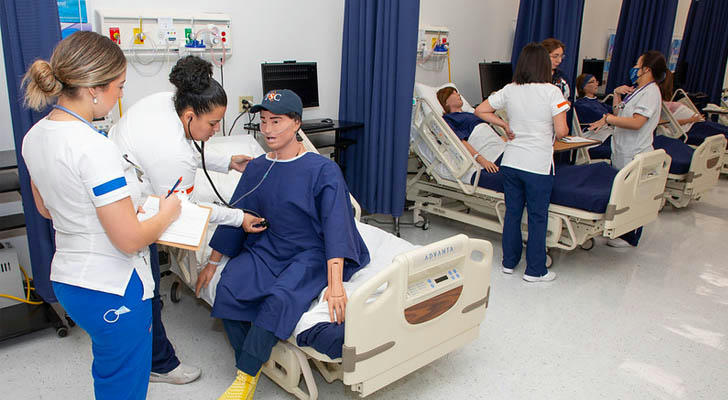Nursing Courses Unveiled: From Beginner to Professional, Achieve Your Nursing Dreams
Did you know that the demand for registered nurses in the United States is projected to grow by 6% by 2032, adding approximately 194,500 new positions each year? This surge underscores the critical need for qualified nursing professionals. If you're considering a career in nursing, understanding the educational pathways is essential. This comprehensive guide will navigate you through the journey from novice to expert in the nursing field.

1. Understanding the Nursing Profession
Nursing is a dynamic and rewarding profession dedicated to providing care and support to individuals across various healthcare settings. Nurses play a pivotal role in patient care, health education, and disease prevention. In the U.S., registered nurses (RNs) are integral to the healthcare system, offering direct patient care and collaborating with physicians in treatment plans.
2. Educational Pathways in Nursing
Embarking on a nursing career involves several educational routes, each catering to different aspirations and timelines:
• Associate Degree in Nursing (ADN): Typically a two-year program offered by community colleges, ADN prepares students for entry-level nursing positions. While it provides a swift entry into the workforce, ADN graduates may face limitations in career advancement compared to those with higher degrees.
• Bachelor of Science in Nursing (BSN): A four-year undergraduate program that offers a comprehensive education, including leadership and critical thinking skills. BSN graduates are often preferred by employers and have broader career opportunities.
• Accelerated BSN Programs: Designed for individuals holding a non-nursing bachelor's degree, these intensive programs allow students to earn a BSN in approximately 12 to 18 months. They are ideal for career changers aiming to enter the nursing field swiftly.
• Master of Science in Nursing (MSN): For those seeking advanced practice roles, MSN programs offer specialization in areas such as nurse practitioner, nurse anesthetist, or nurse educator. These programs typically require two years of study beyond the BSN.
3. Admission Requirements
Admission to nursing programs varies by institution but generally includes:
• Educational Prerequisites: Completion of high school or an equivalent, with coursework in biology, chemistry, and mathematics.
• Standardized Tests: Some programs may require SAT or ACT scores.
• Prerequisite Courses: Completion of specific courses such as anatomy, physiology, and microbiology.
• Clinical Experience: Some programs may require or prefer applicants with healthcare-related work or volunteer experience.
• Letters of Recommendation: References from educators or healthcare professionals who can attest to the applicant's suitability for the nursing profession.

4. Curriculum and Clinical Training
Nursing curricula are designed to provide a blend of theoretical knowledge and practical skills:
• Core Courses: Subjects include anatomy, physiology, pharmacology, microbiology, and nursing ethics.
• Clinical Practice: Hands-on training in hospitals, clinics, and community settings, allowing students to apply classroom knowledge in real-world scenarios.
• Specializations: Advanced programs offer courses in specialized areas such as pediatrics, geriatrics, oncology, and mental health nursing.
5. Licensing and Certification
Upon completing an accredited nursing program, aspiring nurses must obtain licensure to practice:
• NCLEX-RN Examination: The National Council Licensure Examination for Registered Nurses assesses the knowledge and skills necessary for safe and effective practice.
• State Licensure: Each state has specific requirements; it's essential to familiarize yourself with the regulations in the state where you intend to practice.
• Continuing Education: Nurses are required to engage in ongoing education to maintain licensure and stay abreast of medical advancements.
6. Career Opportunities and Advancement
The nursing profession offers diverse career paths:
• Clinical Roles: Direct patient care in various settings, including hospitals, outpatient clinics, and long-term care facilities.
• Advanced Practice: Roles such as nurse practitioners, nurse anesthetists, and nurse midwives, which require advanced education and offer greater autonomy.
• Administrative and Educator Positions: Opportunities in healthcare management, policy development, and nursing education.
• Research: Engagement in clinical or academic research to advance nursing science and improve patient care.
7. Financial Considerations
Investing in nursing education requires careful financial planning:
• Tuition Costs: Varies by program and institution; public colleges generally offer lower tuition rates than private institutions.
• Financial Aid: Scholarships, grants, and loans are available to assist with educational expenses.
• Return on Investment: Nursing offers competitive salaries, with registered nurses earning a median annual wage of $75,000 as of 2020, according to the U.S. Bureau of Labor Statistics.

8. Future Outlook
The nursing field is evolving with advancements in technology and changes in healthcare delivery:
• Telehealth: The rise of telemedicine has expanded opportunities for nurses to provide care remotely.
• Aging Population: An increasing elderly population is driving demand for healthcare services, particularly in geriatrics.
• Global Health Initiatives: Nurses are integral to addressing global health challenges, including pandemics and health disparities.
9. Steps to Embark on Your Nursing Journey
• Research Programs: Identify accredited nursing schools that align with your career goals and preferred learning format.
• Prepare Application Materials: Gather transcripts, standardized test scores, letters of recommendation, and a compelling personal statement.
• Plan Financially: Explore scholarships, grants, and loan options to support your education.
• Engage in Healthcare Experiences: Volunteer or work in healthcare settings to gain exposure and strengthen your application
